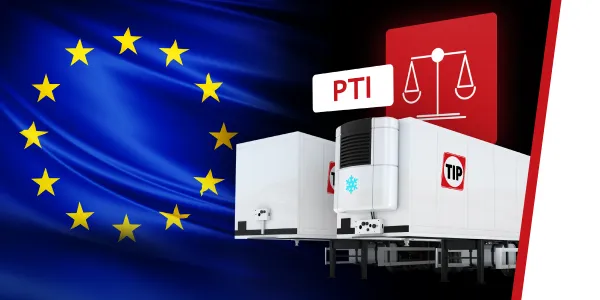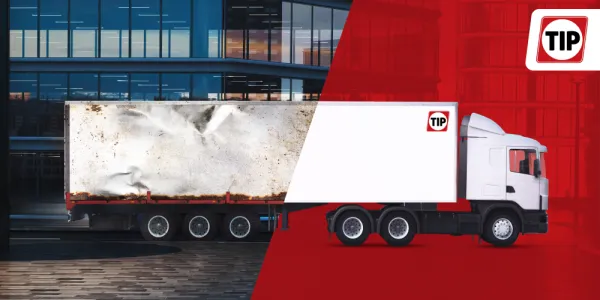Disruption is the new transport normal

Disruption is the current name of the game in the transport industry. This upheaval is caused by multiple factors ranging from climate change to the “sharing economy”. How can fleet managers remain ahead of their competitors and leverage these disruptive times to gain more business? Trailer rental, with its innate flexibility, is a powerful option.
Key disruptive factors
What developments are provoking disruption in the transport industry?
- Climate change – Governments and citizens are increasingly worried about the growth of traffic on the roads and the pollution it generates. This has led to initiatives from inter-governmental organisations such as the EU to reduce CO2 emissions from trucks and the search for alternative powertrains to diesel engines.
- Urbanisation – People are moving in greater numbers to live in cities, amplifying the issue of pollution and road traffic congestion. This has prompted some cities such as Madrid to impose strict controls on emissions of vehicles in their city centres, prioritising access to electric and other low-emission vehicles and keeping away diesel and petrol vehicles. El País reports that Madrid’s new emission controls have led to traffic dropping by nearly 32 percent in some parts of the city. Athens, London and Paris are following shortly with similar initiatives. (source: The Verge) These measures all affect the “last mile delivery”.
- The “sharing economy” – The“sharing economy” is “organized through a technology platform that facilitates the exchange of goods, assets, and services between people across a varied and dynamic collection of sectors”. (source: Freightwaves) High profile examples of sharing models include AirBnB with homes or Lyft and Uber with private cars. It will also become integral to the road freight transport industry.
- The Amazon effect – PwC reports that between 2012 and 2017, European internet retailing grew by a compound annual growth rate of around 10% from €156bn in 2012 to €253bn in 2017. The rise of internet retailing and the disruptive effect of online retailers such as Amazon that offer their customers next day delivery has put increased pressure on the supply chain. This has forced logistics and transport companies to innovate in response.
A disrupted transport industry responds!
The disrupted transport industry has responded to challenges in several ways including:
- Mechanical technology – In the race to help the transport industry meet future emissions targets, truck manufacturers are developing new powertrain technologies to enable fleets to switch their trucks to cleaner technologies than diesel. For example, in addition, to start up Nikola Motors, Hyundai and Toyota are planning to launch hydrogen-powered electric semi-trucks soon. More immediately available are electric-powered light commercial vehicles to help fleets fulfil last mile deliveries in busy urban zones.
- Digital technology – Commercial road transport vehicles are becoming increasingly digitally and data-driven thanks to technological advances in machine learning, artificial intelligence, IoT and telematics. These technologies focus on helping fleet managers, drivers and/or vehicles themselves to make better decisions. Intelligence gathering is at the heart of these new technologies, usually via sensors. Jeremy Rifkin, author of “The Zero Marginal Cost Society: the Internet of Things, the Collaborative Commons and the Eclipse of Capitalism” estimates that by 2030 “there will be more than 100 trillion sensors connecting the human and natural environment in a global distributed network”. (source: Freightwaves)
New opportunities
Digitalisation has disrupted road freight transport enabling fleets to adopt various technologies today such as adaptive cruise control and predictive maintenance and will eventually lead to an ability to save costs by having their trucks travelling in platoons with only one driver on alert to control the trucks in emergency and further down the line to fielding autonomous trucks. In relation to the developments in road freight transport in the USA, management consultant McKinsey said that they expected highly automated driving in geofenced areas by 2020 and full autonomy on highways by 2025 with pick-up and drop-off operations in the first and last mile. They also believe that platooning will be a reality on highways by 2022 or 2023. (source: Freightwaves)
- Moving to the Sharing Economy
Deloitte’s Ted Choe, Principal of Strategy and Operations predicts that “heavy users of transportation services could shift to shared platforms to fulfil certain types of demand, potentially freeing up cash, minimising vendor lock-in, and keeping prices aligned.” (source: Freightwaves) He outlines six areas in which transportation companies will benefit from the Sharing Economy. They include:
- regional carriers collaborating with their competitors to enable them to deliver outside their normal coverage areas.
- wider use of global freight exchanges. Examples in Europe include 123Cargo and Cargocore.
- using multi-modal handoffs between carriers at points mid-way through deliveries.
- crowdsourcing assets in the supply chain. The advantages are particularly strong for the most expensive part of the delivery, the last mile. Cargomatic in the USA is an example of this Uber-style model which matches loads with drivers with spare capacity at a specific time, going to a specific place.
- Warehousing is also joining the crowdsourcing revolution with companies emerging to “Uber” warehouse space.
- Predictive analytics is improving safety using crowdsourced data, for example, to help drivers predict the weather and avoid certain routes in poor weather conditions.
Tackle disruption with TIP, your flexible partner
Flexibility trailer capacity is key for a fleet manager wanting to exploit the opportunities offered by a disrupted transport industry. TIP Trailer Services provides customers flexibility through trailer rental. They are available in all forms from standard semi-trailers to the more specialist trailers such as reefers. Flexibility gives the fleet manager the opportunity to bring on additional trailers to handle the peaks of unexpected demand and return them in slower times, with little notice and without the need to own the assets outright. Through rental, fleet managers can benefit from the latest technologies.
If you want to be a winner as disruption shakes up the industry, choose flexible trailer rental through TIP. For further information, please contact us using this form.












